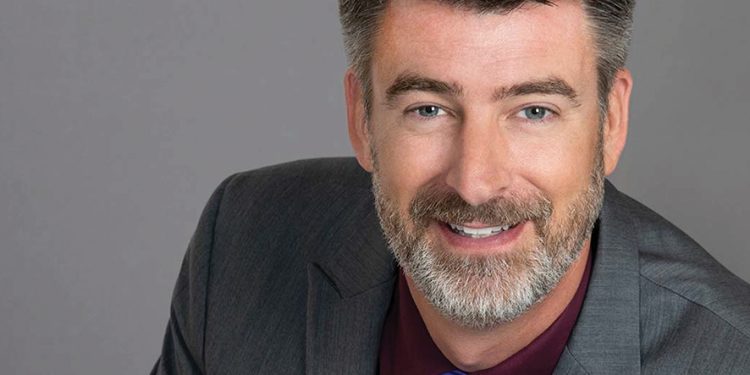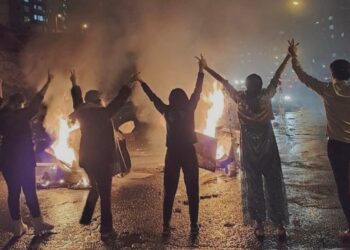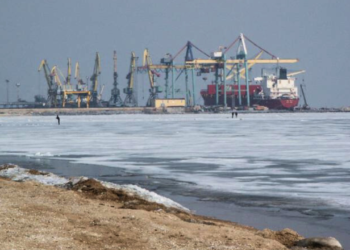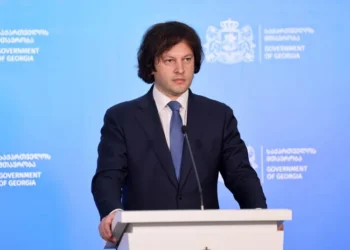One year into the Ukraine war – what has transpired, what have we learned and where are we at? RFE/RL’s Georgian service put its questions to American geopolitical analyst and best-selling author Peter Zeihan, who served as an analyst and later vice president at the Austin-based geopolitical intelligence firm Stratfor.
“What we’ve learned is that geography is not dead as a determining factor in international relations. Never has that been more true for the Russians,” he tells us. “The Russian territory just isn’t rich – the farmland is poor; the population is spread out. And because of that, they’ve never been able to build a road. Everything that has to be moved by rail. And in that sort of environment, the military is woefully slow, because after you get to the rail depot, everything has to be moved laboriously to an area the train can’t get into.
“The Russian strategy has been to expand outward until they reach a zone where there are some natural barriers that separate them from the rest of the world, things like the Carpathian Mountains and Baltic Sea. And then, between those barriers, they put very slow moving, undercapitalized low tech forces in big clusters, as a static footprint to plug the gaps. During the Soviet period, the Russians controlled all of the access points to their interior space, the most secure they’ve ever been. And with the Soviet collapse, they only controlled one. So what Putin has been doing for the last 23 years is rebuilding those four positions. And Ukraine, unfortunately, is on the wrong side of some of those positions from the Russian point of view- not only do they need to conquer every scrap of Ukraine, they then need to take the war northwest. It is wrong to think of this as a miscalculation; it’s wrong to think that Putin is doing this just because he can: This is about the survival of Russian ethnicity. And it really is a ‘them or us’ situation.”

You predicted the Ukraine invasion in 2014. What was your logic?
The Russian Federation has no territorial integrity protection. Their borders are completely indefensible, unable to resist any meaningful assault, be it military, strategic, economic or cultural. Between the World Wars, Soviet mismanagement and the post-Cold War collapse, the Russian demography has inverted. They’ve got more people 40+ than younger. They’ve had up to 200,000 fatalities in this war so far. They’ve realised they only had 8 million men in their 20s and a million of them fled. This is a precious resource; there are not enough Russians to continue the ethnicity long-term. It’s entirely possible that we’ll have nearly a million dead Russians by the end of the year. The demographic hit of that would be catastrophic. This was always going to be the last major conventional campaign the Russians fought because they just aren’t going to have enough men on the other side of this.
And Russia’s favorite tactic of throwing numbers at problems only exacerbates that catastrophe.
In the past, it has always worked because the Russians have been the more technically advanced of the peoples in their space; they’ve had the advantage of industrial technologies, including things that expand lifespan and lower child mortality. But since the collapse of the Soviet system, they have regressed significantly in terms of public health in all age groups. And that’s in addition to the problems they’re having with heroin, multidrug resistant tuberculosis, HIV and alcoholism. So the Russian population, while still physically larger than anyone else’s in the former Soviet empire, is declining fast. Child mortality is creeping back up, and the birth rate is down significantly. So this time, there is no longer a backup generation. They can’t do such a war again. When I say this, I’m not talking about just the Ukraine war, because from the Russian point of view, there’s going to be another phase to this that goes into Poland, Romania, Moldova, as well as the Baltics. The Western goal here is to equip the Ukrainians with sufficient armaments so they can destroy this last military effort, and end Russia as a strategic power. The country will not have enough people aged 30 and under to even theoretically launch a significant war in the future. And that’s a different environment in Europe. But that’s the goal. That doesn’t mean that’s how it’s going to go, though.
Realpolitik-wise, what does that translate into? Is a prolonged war in the West’s interest?
It’s not that I think the Europeans are attempting to prolong the war, but there’s a recognition that the scale of destruction of Russian forces has to be complete, or we’re going to be doing this again in Poland very soon. What we want is for the Ukrainians to trigger a mass fatality event that so overwhelmingly defeats the Russians forces, they lose the capacity to carry out offensive operations before they can get more troops in. There are two ways that might happen. The first is tanks- in a war of numbers, Ukraine will never win. They have to be more mobile. But the muddy season in Ukraine has extended into the depths of winter, it just hasn’t gotten cold enough for the Ukrainians to maneuver. Even if they’re inflicting three to one casualty ratios, that’s not enough, they need to get at least eight to one, and if they can’t use their armor, they can’t achieve that. The second is the Crimea canal. It’s the only source of water for 80% of the food production in Crimea, and the Ukrainians now control the sluice gate in Kherson. They’re not going to turn it on this spring, which means that 80% of the food production in Crimea this year is not going to happen. You combine that with another couple of hits on the Kerch Strait bridge, and the Russians will not be able to supply the population of Crimea. And that is where the best Russian troops are at the moment. So if you can trigger it a humanitarian catastrophe in Crimea, that would generate the sort of numbers and the sort of impact that might actually force the Russians to break off. Keep in mind that in no war have the Russians ever sought peace terms, or accepted them when they could still fight.
The Russian troops are badly led, have low morale, poor equipment; they’re supported with poor logistics, this is normal for them. What’s not normal is how few Russians are involved in the conflict at this point. And that is changing very rapidly.
They started the war with roughly 100 – 150,000 troops. They’re going to have up to 800,000 come May, pushing out of Donbas along multiple lines of access to make the Ukrainians divide their forces. We’ll also see approaches from Belarus. That probably won’t be nearly as strategically significant, but designed to force the Ukrainians to disperse their forces. That’s the Russian plan. The Ukrainian plan is to concentrate their armor and artillery into a single mailed fist and drive down from Zaporizhya directly to the Sea of Azov, because if they can sever the logistical truck connection that is coming in from the Donbas along the Sea of Azov into the southern front, then Crimea goes from being a potential launching point for the Russians to being a complete strategic vulnerability. If the Ukrainians can reach Azov, they can blow up what’s left of the Crimean bridge. And if they can cut the line north of the Sea in places like Melitopol or Mariupol, then these territories will be completely cut off and you can have a mass fatality event among the best Russian forces and then swing east and deal with Donbas.
There was hope the Ukrainian assault was going to happen over the winter, that, once the ground froze, they would be able to use their heavy equipment in an assault. But the ground has been churned up and so they’ve been stuck in a slugging match out east. Time is definitely on the Russian side here. Ukraine needs either cold weather or a very dry spring, because if they wait for May when the muddy season ends, the Russians will be in a position to move at the same time. They’ll have at least another 400,000 troops in play, adding to the 250,000 in play at the moment.
Has Ukraine got what it needs for its offensive to be successful?
We will have battle tanks in place, longer range artillery and rockets, small diameter bombs -critical for disrupting Russian logistics. But, we’re talking about a mass of relatively untrained troops that can be forced to just run across an open field and absorb ammo. You throw enough bodies at it and, even if you break their logistics, they’re going to do really well. For the Ukrainians to win this, they have to break up the Russian formations. And that requires speed. Luckily, for the Ukrainians, they do have a significant amount of strategic depth. And the Russians are slow moving forces. So, if nothing can happen until May, I would guess Ukraine will abandon the entirety of the Eastern Front and try to make a lightning run towards Mariupol or Melitopol and cut off Crimea as the Russians continue to creep westward. It would look a lot like World War Two, because that’s exactly how the German-Russian front went back then.
Let’s talk About the impact of this war on Russia’s neighborhood, starting with Moldova, given that Lavrov just said that the West is trying to turn it into the next Ukraine.
If Ukraine wins, the Russians are going to get kicked out of the entire near abroad, and they’re going to lose their global position, because everyone who doesn’t like the Russians will move against these dispersed forces that no longer have a central control node. They’ll be broken up and ejected. It will be a catastrophic, screaming retreat of Russian power from everywhere. That will not stop when it reaches Russia’s borders, because you will have uprisings and rebellions in places like Tatarstan and Chechnya, and that will be the end of the Russian Federation. It’ll take a decade or two, but that will absolutely be the end. If Russia wins, then everyone in the entire near abroad is going to be very circumspect, because the Russians are going to move further west and they’re going to double down on their attempts to plug all of those gaps, and there are gaps in Turkmenistan and Kazakhstan and Georgia, and Azerbaijan as well. We’ll have a push of Russian power using the tactics designed for Ukraine everywhere, unless countries just acquiesce. If Ukraine wins, Moldova is on track for NATO and EU membership. If Ukraine loses, Moldova is the next country to get conquered. It’s that simple.
In the Caucasus, the Russians have a lot less friendly approach to Georgia than they have towards the Ukrainians. And I’d be terrified at the degree of human destruction if Georgia does not welcome in the Russian troops if Ukraine falls, and if it does, Georgia will be invaded very, very quickly, and it will be brutal. Azerbaijan, probably not quite so brutal, but very soon thereafter. But if Ukraine wins, then we’re going to have another Ossetian war and another Abkhazian war, where the Georgians eject the Russian forces, and they will get help from other countries to do so.
Russians have the lash of demography behind them; they know this is their last chance. If there is a ceasefire, it will merely give the Russians time to regroup and launch another assault.
In the scenario where Russia actually loses, at what point does Putin reach for the red button?
I’m not overly concerned about a nuclear exchange. The Americans have made it very clear that they have tapped into Kremlin communications and we know physically where Putin is at all times. He knows that if he launches a nuke at the US, there is no version of history that will record him as anything other than the person who ended the Russian Federation, and that he personally will not live to see the future. So I’ve never considered that to be on the table. I’ve never considered nuking Ukraine to be on the table, either, because, ultimately, the Russians want to occupy it and move on.
If the Russians win and get to the Polish frontier, they know that their military, conventionally, is no match for NATO. Then they would call up London and Stockholm and Berlin and Paris, say, “We’re going to nuke you unless you withdraw all political and military support from Poland by noon, in which case, we’ll cancel that, conquer Poland and then we can all be friends again.” At that point the Westerners would have to make a really hard decision because the Russians know they can’t conquer Poland and Romania conventionally. Ukraine proved that. Nukes are all they’ve got left. And there’s no point going halfway in this because they have to get to those geographic gaps, and that means they have to make it to Warsaw.
You said: “It’s rough for the Ukrainians, but from the American point of view, it is difficult to imagine a better, more thorough, and above all safer way for Russia to commit suicide.”
There are only three countries in the history of the US that have ever threatened the mainland. One was our colonial founder, our cultural parent, the United Kingdom. And with the flip into the world wars, Britain basically became a junior ally. So that’s done. The second was Mexico. After the Mexican American War, we confiscated half their territory, and Mexico today is our closest demographic cousin and our greatest economic partner. So that’s done. And then you’ve got the Soviet Union / Russia, which has threatened us since 1945. The Americans were never going to back down from a fight here. I had my doubts, but the strategic necessity of ending that threat forever is an opportunity does not present itself very often. The Americans are going to provide the Ukrainians with any system the Ukrainians can prove they can operate competently, and the Abrams are not the end of the conversation. The risk, of course, comes with what happens if the Ukrainians lose.
Russia is not going to die quietly. They’re still by far the dominant demographic within the former Russian space. And just because they cannot conquer the rest of the former Soviet Union anymore, does not mean that the war for the future of Russia is over. This is a country where probably about a third of the population is not ethnic Russian, and they have been treated almost as badly as the Ukrainians are being treated now. So, if the Russians are defeated in Ukraine, we then have the breakup of the Russian Federation itself, and its disintegration into a couple of dozen different principalities that do not see the world the same way. And nukes are part of that conversation. So this, from the American point of view, is a defining moment. From the Russian point of view, from the former Soviet point of view, this is just the beginning of the end.
Interview by Vazha Tavberidze














